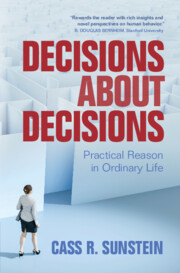Book contents
- Decisions about Decisions
- Decisions about Decisions
- Copyright page
- Contents
- Tables
- Preface
- 1 Second-Order Decisions
- 2 Deciding to Opt
- 3 Deciding to Know
- 4 Deciding to Believe, 1
- 5 Deciding to Believe, 2
- 6 Deciding Inconsistently
- 7 Deciding to Consume, 1
- 8 Deciding to Consume, 2
- 9 Deciding by Algorithm
- 10 Deciding for Oneself
- Epilogue “Get Drunk!”
- Acknowledgments
- Index
8 - Deciding to Consume, 2
The Case of Social Media
Published online by Cambridge University Press: 29 June 2023
- Decisions about Decisions
- Decisions about Decisions
- Copyright page
- Contents
- Tables
- Preface
- 1 Second-Order Decisions
- 2 Deciding to Opt
- 3 Deciding to Know
- 4 Deciding to Believe, 1
- 5 Deciding to Believe, 2
- 6 Deciding Inconsistently
- 7 Deciding to Consume, 1
- 8 Deciding to Consume, 2
- 9 Deciding by Algorithm
- 10 Deciding for Oneself
- Epilogue “Get Drunk!”
- Acknowledgments
- Index
Summary
In recent years, there has been a great deal of discussion of the welfare effects of digital goods, including social media. A national survey, designed to monetize the benefits of a variety of social media platforms (including Facebook, Twitter, YouTube, and Instagram), found a massive disparity between willingness to pay (WTP) and willingness to accept (WTA). The sheer magnitude of this disparity reflects a “superendowment effect.” Social media may be wasting time goods – goods on which people spend time, but for which they are not, on reflection, willing to pay much (if anything). It is also possible that in the context of the WTP question, people may be giving protest answers, signaling their intense opposition to being asked to pay for something that they had formerly enjoyed for free. Their answers may be expressive, rather than reflective of actual welfare effects. At the same time, the WTA measure may also be expressive, a different form of protest, telling us little about the actual effects of social media on people’s lives and experiences. It may greatly overstate those effects. In this context, there may well be a sharp disparity between conventional economic measures and actual effects on experienced well-being.
Keywords
- Type
- Chapter
- Information
- Decisions about DecisionsPractical Reason in Ordinary Life, pp. 144 - 158Publisher: Cambridge University PressPrint publication year: 2023

